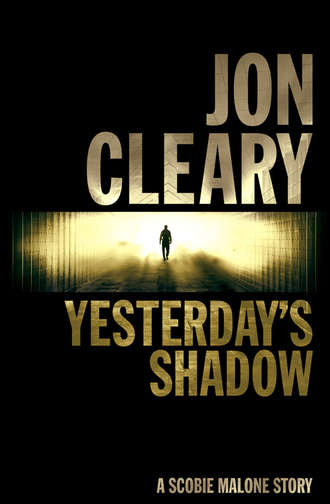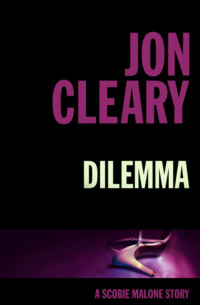
Полная версия
Yesterday’s Shadow
Malone always hated this intrusion into another man or woman’s personal life: ‘There had been intercourse before your wife was murdered –’
The hand tightened even more: ‘She’d been raped?’
‘No, sir. The Medical Examiner said there was no evidence of that – rape always shows. Bruises, marks, things like that.’
The hand fell loose. ‘Jesus Christ, you know what you’re saying?’
Husband to husband, not cop to diplomat: ‘Yes, sir. And I hate telling you this. But it may be our only clue to who killed her. They are taking semen samples, there’ll be DNA tests when we have a suspect –’
Pavane waved a hand, not wanting to hear any more. He looked older, but age is a ghost that comes and goes till finally it settles. At last he said, ‘You know what you’re saying? You are accusing my wife –’
‘Sir, please –’ Malone held up his own hand. ‘I’m not accusing your wife of anything. I hate scandal and I’m not interested in it. All I want is to find out who killed her.’ He was about to add: and why. But now was not the moment.
Pavane sat silent and at last Malone said, ‘You were surprised when I said she was registered as Mrs Belinda Paterson. Was that her name before you were married?’
‘No.’
Again a long silence, then Malone said, ‘What was her name?’
A deep sigh; then Pavane’s gaze focused again. He frowned, drew in a deep breath: ‘Page, Wilhelmina Page. But she was always called Billie.’
‘You never heard her mention the name Paterson?’
‘Never.’
‘She had a credit card in that name.’
‘I never saw it. She had an American Express card as my wife, Mrs Billie Pavane, but I never checked her account. She was a good businesswoman, she was experienced.’
‘Tell me something about her.’ Still gently.
Pavane took his time, as if he had been asked to open a very personal diary. ‘We’ve been married two years – very happily married. My first wife died six years ago and I thought I’d never marry again. Then …’ He turned a direct gaze on Malone. ‘Are you married?’
‘Yes. Very happily. I have two daughters and a son, all grown.’
‘I have a son by my first marriage. He disappeared after his mother died. We never got on –’ He stopped. ‘Do you want to hear all this?’
‘I want to hear about your second wife. Had you known her long?’
‘No, not that long. She came to Kansas City – that’s my home town – about four years ago. She was a business consultant with our largest bank – handled public relations, things like that. I met her through politics – we were both raising funds for a local senator.’
‘You said she came to Kansas City – where did she come from? Her credit card gave an address in Oregon.’ He took out his notebook, checked. ‘Corvallis. Is it a big town? Was she a business consultant there?’
‘It’s not large. The State College is there. She was born there, her father worked for the college – not an academic, he was just some worker around the grounds.’
‘She went to college? Graduated there?’
‘No. Her parents were killed in an auto accident when she was – I’m a bit hazy here – seventeen or eighteen. She was an only child. She left Corvallis and went out to San Francisco. Look, why all the background?’
‘Mr Pavane, we’re puzzled why she booked into a hundred-dollar-a-night hotel, under an assumed name. I take it that isn’t the usual sort of hotel she’d stay at?’
‘No-o. I’m just as puzzled as you are. We’ve never been short of money. I’m comfortable –’ Meaning he was wealthy; or, in Australian terms, rich. ‘Billie liked the best – she was frank about that and I didn’t mind. My first wife was the same. Women are like that.’
He wasn’t entirely a diplomat: the three Malone women would have had reservations about him after that remark. But Malone was diplomatic: ‘Yes, I guess they are. Had your wife been married before? She was what – in her late thirties?’
‘Thirty-eight. No, she hadn’t been married. She’d had boyfriends, but she had never settled for a husband. She was too busy making her career, she said. I – well, I accepted that. I didn’t talk about my first wife and she didn’t talk about her ex-boyfriends. You’re a married man, you know how it is.’
Not yet: I haven’t been home so far. ‘You said you met in politics. Did she have political ambitions?’
‘No, not at all. Not as far as running for office. We were working together on last year’s presidential campaign – there were hints of an ambassadorship for me and that excited her. We thought of one of the smaller countries in Europe. Denmark, maybe – I’d been to Copenhagen when I was at university in England and I’d liked it. Then the President named Australia – he thought I had certain talents, connections, that would work out here.’
‘And your wife liked that? I understand she’d been out here.’
Pavane looked puzzled again. ‘Who told you that?’
‘Miss Caporetto. She went to lunch with your wife and your wife told her she’d been here on a quick business trip some years ago.’
Pavane shook his head emphatically. ‘Miss Caporetto must’ve got it wrong. My wife didn’t want to come here.’
‘Why not?’
Pavane almost smiled, took his time. ‘Do you want me to be frank or diplomatic, Inspector?’
‘Frank, sir. I’m not so nationalistic that I think this is Utopia. One of our Prime Ministers once said not to forget we were at the arse-end of the world. Or words to that effect.’
The Ambassador did smile this time, though it was an effort. ‘Those were the words my wife used. Though she pronounced it ass-end.’
‘In the end she changed her mind?’
‘It took a lot of persuasion on my part.’ He was silent a long moment and Malone let him take his time. Then: ‘How much do we have to tell the media?’
‘Just the facts, sir. How she was murdered, who she is. Nothing more than that. We don’t have to tell them what happened beforehand.’
Pavane was grateful: ‘You’re an understanding man, Inspector.’
Malone nodded in acknowledgement. ‘Why did she come to Sydney on this particular trip?’
‘She wanted to go to the New South Wales Art Gallery. There’s an exhibition on there – the best of Australian art. Back home in Kansas City she’s on the board of the Nelson Gallery – that’s our main gallery. My father bought and donated paintings to it. She’s on leave of absence, but she’d told the board she would look at this collection – we don’t see much Australian art in our Mid-West.’
‘Righto, sir. We’ll see if she ever got to the gallery. As for what I’ve told you about last night, we’ll keep a lid on it as much as possible.’
‘Is there likely to be a leak from – well, the morgue staff?’
‘The DDFM –’ He grinned, trying to lighten the mood. “The Deputy Director of Forensic Medicine, she did the post-mortem –’
‘I met her at the morgue.’
‘She’s a close personal friend of me and my wife and she’s the wife of my second-in-command at Homicide. She would sack anyone who talked out of turn to the media.’
‘Good enough. I apologize for questioning them. Will you tell Joe Himes?’
‘I’m afraid I’ll have to, sir, if he’s to work with us. But no one else.’ He stood up, put out his hand as the other man rose. ‘I’m sorry, sir. I’ll do everything I can to keep the dirt out of this. It’s not going to be a tabloid carnival.’
‘I’m going back to Canberra this afternoon. I want the body of my wife shipped back to Kansas City – I’ll go with her. Dr Clements, your friend, said they would release her within the next day or two, soon as the post-mortem is finished. There’ll be a press release put out from the embassy when I get back this afternoon. It will say as little as possible.’
‘We’ll try to do the same at this end, sir. You’ll be coming back from Kansas City?’
Pavane hesitated. ‘I’ll think about it. I really loved my wife, Mr Malone – we were very happy together. I have to get used to the idea that she is gone.’ Just before he opened the door to go out he turned. ‘Thanks, Mr Malone.’
Malone could only nod.
2
The Consul-General’s office was a bustle of departure. Random left at the same time as the Ambassador, DCM Kortright and RSO Bodine. Malone and Himes borrowed Ms Caporetto’s office again. Malone stood at the window gazing down on Martin Place at the ants coming back from lunch. There had been the usual lunchtime concert in the small amphitheatre in the middle of the tree-lined plaza and the musicians were packing their gear and moving on to – what? And what were all the human ants scurrying to? From here on the 59th level destiny was a distant prospect. He turned back to Himes: ‘Joe, what are your feelings on destiny?’
Himes was seated in the chair behind the desk, the presiding chair. Pull your head in, Malone, he’s not taking over. ‘I never worry about destiny. That’s for judges and juries.’
Malone grinned: he was going to like this man. ‘Righto –’
‘Righto? I thought only upper-class Englishmen said that. You know – “Righto, old chap.”’
‘If I’d been born an upper-class Englishman, my dad would’ve strangled me at birth. He’s never been near Ireland, but he’s an Irish patriot – more so than my mother, who was born there. No, righto has just stuck to my tongue since I was a kid.’
‘What do you say when things are okay?’
‘Okay.’
Himes gazed at Malone and after a long pause said, ‘I think you and I are gonna get along, Scobie.’
‘I hope so, Joe. We’re going to need help – a lot of it.’ He sat down, then told Himes of the intimate personal side of the Pavane murder. ‘We’re not putting out anything about that – our media would make a meal of it.’
‘Not just yours. Ours, too.’
‘There’s something else besides the sex bit. Mrs Pavane has some mystery about her, something that seems to puzzle even the Ambassador. Does the FBI have a bureau in Oregon?’
Himes smiled; he had big white teeth that seemed to alter the whole set of his face. Almost impish, like a boy of long ago suddenly appearing in the man he had become. ‘We’ve got ’em all over. The local cops think we’re a pain in the ass.’
Malone returned the smile. ‘We think the same about our Feds here. Anyhow, can you have them trace –’ He looked at his notebook again. ‘Mrs Pavane’s maiden name was Wilhelmina Page, but she was known as Billie. She also used an American Express card under the name of Mrs Belinda Paterson. Home address, Corvallis. Her parents, who were killed in a car accident, lived there – roughly, I guess, in the late seventies. Her father had some sort of job at the State College, a groundsman or something.’
‘I’ll get on to that pronto.’ He looked at his watch. ‘Unless they’re having an early night.’
‘The FBI sleeps?’
Again the smile. ‘Not as much as the CIA.’
In heaven the seraphim criticize the cherubim, who look down on the thrones: the original bureaucracy.
‘Anything else?’
‘Mrs Pavane told Miss Caporetto, one day at lunch, that she’d made a quick business trip to Sydney some years ago. The Ambassador says that can’t be right. But at the lunch some feller came up, tried to speak to Mrs Pavane, but she just wiped him. Is there any way you can trace if a Miss Page or a Mrs Paterson came to Sydney eight or nine years ago? We’ll check with our Immigration.’
Himes made a note. ‘I’m told there was another homicide at the same hotel. Any connection?’
‘We don’t think so. It’s a domestic. I’m on my way now to question the wife.’
‘I don’t envy you. In my job I never got caught up in domestics, not like local cops. This one –’ He shook his head as if in disbelief. ‘This one’s the closest I’ve ever been to a domestic.’
‘Joe, a domestic for us is when the husband kills the wife or vice versa.’
‘I know. But from what you’ve told me, this isn’t the usual security thing. Terrorists, someone with a grudge against the US – it looks like nothing more than plain murder. To which Mrs Pavane might’ve contributed by being where she was in that flea-bag.’
‘It’s not a flea-bag, Joe. It’s just a hotel where the rate is about three or four hundred dollars a night less than she’d be used to paying. What do you know about her?’
‘You couldn’t meet a nicer woman. She had – what do they call it? – the common touch. I know no more about her than what I saw down in Canberra – the embassy staff love her. She’d have been checked by the FBI back home before she and the Ambassador got the appointment – it’s standard procedure –’
‘They missed somewhere along the line. They didn’t link her with Mrs Belinda Paterson.’
‘The FBI is thorough –’
‘Joe, I’m not criticizing. I’m stating a fact, that’s all. Mrs Pavane apparently has had three names – I’d like to find out which was her real one. Then, maybe, we can start tracing her killer.’
‘You think it was someone from her past who killed her?’
‘I haven’t a clue, Joe. But it would be better if it were, wouldn’t it?’
Himes stood up, looking weary. ‘I dunno, Scobie. There are no good aspects to murder, are there?’
‘I’m not sure of that, either. I’ve seen some bastards who were better dead than alive.’ He, too, stood up. They both looked weary enough to be at the end of a case rather than the beginning of it. ‘What if the bloke who killed her didn’t know who she really was? She had all her valuables up in the room with her. Only her passport was in the safe deposit box. Didn’t she want him to know who she was?’
‘I hate the thought she might just have been there as a pick-up. Are you gonna ask the Ambassador what their sex life was like?’
Malone grinned without humour. ‘I think I’ll leave that to Foreign Affairs.’
3
On his way out Malone looked in on Consul-General Avery. ‘We’ve started, sir. But there’s a long way to go.’
‘I once played in a Rose Bowl game. We were behind thirty-eight to nil at the end of the second quarter.’
‘Did you win?’
‘No, but we gave UCLA a helluva fright.’
Malone shook his head. ‘I’ve spent all my police career trying to give crims a fright. It never works, not with the pros. This feller who killed Mrs Pavane, he’s way ahead at the moment.’
‘You sound pessimistic.’
‘No, just realistic. It’s a cop’s philosophy.’
Ms Caporetto rode down in the lift with him. She was wearing a thick brown coat and the sort of tea-cosy hat that he thought was worn only by seven-year-olds with fashion-conscious mothers. She did not look demure, nor as innocent as a seven-year-old, but the body was not visible to be whistled at.
‘I’m on my way to see your Premier.’
‘Is he getting into the act?’
‘I don’t think so. It’s a courtesy call on our part. We want to ask if everything can be played down, if and when the questions come up in Parliament.’
‘Not if. When. Another twenty-four hours and the Opposition will be asking why we police haven’t wrapped it up. It’s par for the course. Never be constructive when in Opposition.’
‘I love working here. You’re such a primitive lot.’ But as she stepped out of the lift she gave him a smile that said it was a compliment.
He drove back to Police Centre and Delia Jones. The day had turned grey, but the clouds were still high, scarred by wind. Down at street level another wind chased paper down the gutters, straightened people into mannikins as they turned corners into it. A day for a grey mood.
He first went into the Incident Room, where Gail Lee and Sheryl Dallen had finished the display board. There was not much: a few photos, names, diagrams. There would have been less if the coverage had been of only a single murder.
‘Not much, is there?’
‘Did you get anything new from the Ambassador?’ asked Gail Lee.
‘Just that Mrs Pavane has a murky past. No,’ he said as both women raised their eyebrows. ‘Nothing dirty. It’s just that even Mr Pavane can’t tell us much about his wife before he married her.’
Then he looked at the photo of the dead Boris Jones. Even in death there was a look of cruelty in the broad Slav face; or was that his own imagination, a desire, too late, to protect Delia? ‘What would you say of a bloke like that?’
‘A bastard,’ said Sheryl. ‘But some women would find him attractive.’
‘Mrs Jones must have. How is she?’
‘A bit edgy,’ said Sheryl, ‘but nothing much. She’s more worried about her kids than about what she’s done.’
‘Her lawyer turned up yet?’
‘Mrs Quantock’s brought in a solicitor from out their way, Balmain. She and Mrs Jones have been arguing about who’ll pay – evidently Mrs Jones has got nothing. It looks like it might be a Legal Aid job.’
Legal Aid did its best but it could never afford the talent that could turn a no-win case into an acquittal. ‘Righto, I’d better see her. You come with me, Gail.’
‘Do we keep both murders on the one board?’ asked Sheryl.
‘I hope not.’ He would like the Jones murder dropped off the board altogether. ‘We’ll see what she has to tell us.’
‘Not us,’ said Gail. ‘You.’
‘Don’t remind me.’ He looked at both of them. ‘You know I’d rather walk right away from this?’
‘Of course,’ said Sheryl and he saw at once that their support was genuine. And it was more acceptable because they were women. This was not blokey mateship.
He took Gail into the interview room with him. He was annoyed but not surprised when he saw Mrs Quantock sitting to one side of Delia and the woman solicitor. Rosie Quantock sensed his annoyance for she said at once, ‘I’m here for Delia to lean on.’
‘That’s okay, Mrs Quantock, but don’t interrupt when I’m questioning Delia.’ He sat down, looked at the solicitor across the table. ‘G’day, Pam. Are you taking Delia’s case or are you here just for now? I understand she has asked for Legal Aid.’
‘I’m here for the whole term.’ Pamela Morrow was an old foe, but a friendly one. She and Malone had met years ago when she had been a law student leading demonstrations against this, that and everything and he had been a new police recruit trying to handle gently a woman trying to kick him in the balls. She was a short dumpling of a woman with red hair cut in a bob with bangs and with bright blue eyes that, he knew, could be as challenging as Rosie Quantock’s. ‘I’m on the board of the Women’s Protection League. We’re taking Mrs Jones’ case. Right through from now to acquittal.’
He grinned. ‘You haven’t changed, Pam.’ Only then did he look at Delia. ‘Pam and I are old mates.’
‘Old Home Week,’ said Delia and smiled as if she were here on no more than a traffic charge. He caught a glimpse of the girl he had once been in love with. She had been a pretty girl rather than beautiful; chocolate-boxy, his mother had called her. Prettiness, he knew, faded quicker than beauty; but the years had been too cruel to her. ‘We’re not going to be any trouble, Scobie.’
‘Tell us what happened.’ Not me: us. He had to keep Gail in the frame to protect himself.
‘Tell him everything,’ said Rosie Quantock. ‘How he’s been belting you for years –’
Malone looked at Pam Morrow, who looked at Rosie Quantock. ‘Please –’
‘Sorry,’ said Rosie, but you knew it was just an empty word. ‘But she’s gotta tell him everything –’
‘I will,’ said Delia, hands folded together on the table, steady as two interlocked rocks. She nodded at the recorder: ‘Is that on?’
‘Yes,’ said Gail. ‘Everything you say –’
‘I know.’ The composure was so complete; Malone had to admire her. ‘Well – where do I begin?’
‘At the beginning,’ said Malone, knowing he was making a concession.
‘Well, Boris and I have been married fourteen years. He’s from Leningrad – or what do they call it now?’
‘St Petersburg,’ said Gail.
Delia didn’t look at her; her gaze was solely on Malone. ‘Yes, there. He was a merchant seaman – he came to Australia twice on a ship. I met him, I liked him, he liked me –’ She stopped for just a moment, her gaze still focused on Malone; then she went on, ‘The third trip he jumped ship and stayed on.’
‘He was an illegal immigrant?’ asked Malone.
‘I guess so. They never came looking for him – he got papers, I dunno how. We were happy –’ She stopped again. She’s making points, Malone thought; but ignored them, just looked back at her. She went on again, ‘I had the children and then things started to go wrong –’
‘I’ll say they did,’ said Rosie Quantock. ‘Ten bloody years –’
‘Mrs Quantock,’ said Pam Morrow warningly.
‘Sorry.’
Delia continued: ‘He wouldn’t let Melissa near the house – she was my daughter from my first husband.’ Again the look; again he made no comment. ‘Then the – the belting started. I ran away, twice, with the children. But he came after me each time –’
‘Why did you go back to him?’ asked Gail.
Delia shrugged. ‘Ask any battered wife why –’ For a moment she looked at Gail; then she turned her gaze back to Malone. For the first time there was a plea in her voice: ‘That’s what I’ve been, Scobie. A battered wife.’
He wanted to reach across and press her hand, but refrained. ‘Go on. Tell us about last night. Did you go in to the hotel with the intention of killing him?’
‘That’s a leading question,’ snapped Pam Morrow. ‘Try another one, Inspector –’
‘No, it’s all right,’ said Delia. ‘Yes. I took the children to my mother’s, told her I was going in to tell Boris I was leaving him for good. I wanted him dead, but I don’t think I intended killing him.’
‘Where did you get the knife?’ Malone was wishing he were out of here.
‘I dunno. It was there in the room – I just picked it up –’
Malone said nothing further; it was Gail who asked, ‘Why? Why did you pick it up?’
‘Careful, Delia,’ warned Pam Morrow. ‘You have to be exact about this. It was after Boris hit you, wasn’t it?’
‘You’re advising your client,’ said Gail.
Lay off, Gail! Malone almost shouted.
‘That’s why I’m here,’ said Pam Morrow. ‘To make sure she gives you the exact facts, the exact truth.’
Delia took her time, still looking at Malone as if there were just the two of them in the room. Then she said, ‘It was after he hit me – here and here –’ She pointed to the bruises on her face; still calm, as if they were no more than skin blemishes. ‘He gave me the black eye before he left home.’
‘Bastard!’ said Rosie Quantock.
‘There was a struggle?’ Malone was leaving the questioning to Gail.
But Delia was still speaking directly to him: ‘Oh yes, we fought. We knocked things over – I picked them up and put them back after I’d stabbed him –’ She smiled at him, like the old Delia of long ago; he was beginning to wonder if the composure was a pose. ‘Neat as usual, remember? But I was just trying to get myself together – I mean, I knew I’d killed him, he wasn’t moving –’
‘What did you do then?’
‘Just a minute –’ Malone said. ‘What time was this, Delia?’
‘Some time after midnight – he’ d broken my watch when we fought last night.’ She looked at it now on her wrist. ‘You gave it to me, remember?’
He didn’t remember and he wondered why she mentioned it.
‘That was eight-twenty last night. It’s stopped.’
Malone nodded to Gail, who went on, ‘So you tidied up the store room – what did you do with the knife?’
‘I dunno. I forget.’
‘How did you leave the hotel?’
‘I went out a side door into that alley, that lane, that’s there – I didn’t want to meet any of Boris’ mates. I waited for a taxi outside the hotel.’
Romy had said that Billie Pavane had died eight to ten hours before she was examined: that put that murder around 1 a.m.









